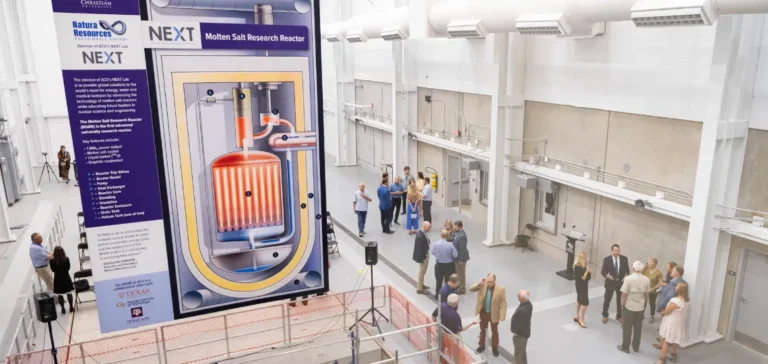The Natura MSR-1 molten salt reactor project, developed by US company Natura Resources, has reached several decisive milestones in its development phase. The company confirmed it has received a critical nuclear fuel allocation from the United States Department of Energy (DOE), ensuring a supply of high-assay low-enriched uranium (HALEU), essential to the reactor’s operation.
This federal decision is part of the DOE’s Reactor Pilot Program, aimed at accelerating the deployment of advanced nuclear technologies. Natura Resources is among the first companies selected for the initiative, reinforcing its position within the strategic US civil nuclear sector.
Dedicated infrastructure in Texas
At the same time, the MSR-1 project has received significant academic and financial support. The Dillard Science and Engineering Research Center (SERC), located at Abilene Christian University (ACU), was delivered in August 2023. Specifically designed to host the reactor, this technical facility streamlines the construction operations of the experimental unit.
The project also received construction authorisation from the Nuclear Regulatory Commission (NRC) for the deployment of the reactor on ACU’s campus, marking the first such approval for a liquid-fuel advanced reactor. In June 2025, the detailed design of the MSR-1 was completed, enabling procurement activities for the reactor system to begin.
Texas legislative funding and industrial timeline
At the regional level, the Texas Legislature allocated $120mn to Texas Tech University, which will be used to support the construction of the Natura MSR-1. This public backing strengthens collaboration between academic institutions and industry in developing next-generation nuclear technologies.
The Natura MSR-1 is based on a low-pressure liquid fuel technology, with potential applications in power generation, water desalination, and medical isotope production. The next steps include assembling critical components and preparing for the test phase, expected after construction is completed.
“We are grateful for the support from the DOE, the NRC, the State of Texas, and our university partners,” said Doug Robison, Founder and Chief Executive Officer of Natura Resources. “The MSR-1 aims to open a new path in advanced nuclear energy.”






















